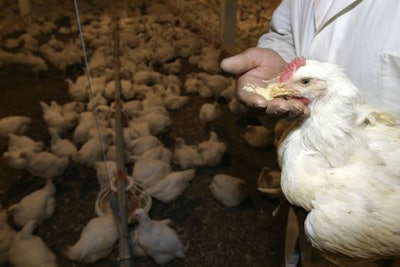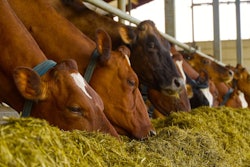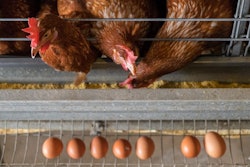
Higher doses, organic forms of zinc in broiler diets may prime immune system for action.
Though more costly, supplementing broiler diets with zinc glycinate instead of zinc sulfate may better prepare chickens to fight disease in the event of an outbreak, according to research from the University of Georgia.
In the trial, headed by University of Georgia graduate student Theros Ng and detailed in next month’s edition of the journal Animal Feed Science and Technology, researchers fed broilers diets containing varying amounts of zinc glycinate or zinc sulfate. Birds that received larger quantities of zinc in either form grew faster, but those fed zinc glycinate instead of zinc sulfate also showed multiple signs of improved intestinal function and immune health, according to Ramesh Selvaraj, an associate professor of poultry science and one of the study’s senior authors.
“Zinc sulfate is the cheapest form out there, but there is a huge push toward this organic form of the mineral,” Selvaraj said. While those who swear by organic zinc insist it brings better results, others hold that “zinc is zinc” and the form of the mineral shouldn’t make a difference, Selvaraj said.
While there is still research to be done to settle the debate — other studies on the topic have come to differing conclusions — this latest study hints at why organic forms of zinc may improve performance, at least in some circumstances.
At least when supplemented at high doses, zinc appears to help the immune system prepare itself to fight potential infections. In the study, chickens fed zinc glycinate had a different balance of cytokines in the intestine and spleen. Cytokines are small proteins that help the immune system communicate and determine how it responds to infection.
“If infection comes, the bird’s ready to fight the infection. It’s like a fire drill,” Selvaraj said.
The zinc glycinate diet also appeared to decrease gut permeability. This could help to reduce the incidence of foodborne disease, but determining that possibility for certain will require additional study, Selvaraj said.
“My biggest question now is, can we use zinc glycinate to reduce the Salmonella or Campylobacter load in poultry products?” he said. “Because it improves gut health and decreases gut permeability.”
Additional data collected during the study indicated that the total amount of zinc absorbed by the chicken, not the type of zinc used, produced the immune and gut health benefits in question, Selvaraj said. However, because zinc glycinate is easier to digest, feeding this organic form of zinc instead of zinc sulfate could increase the amount of zinc that is actually available in the diet.














